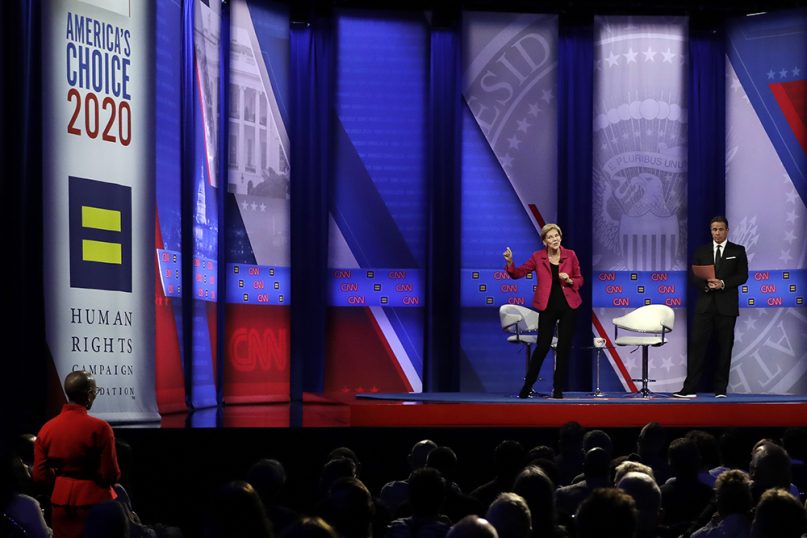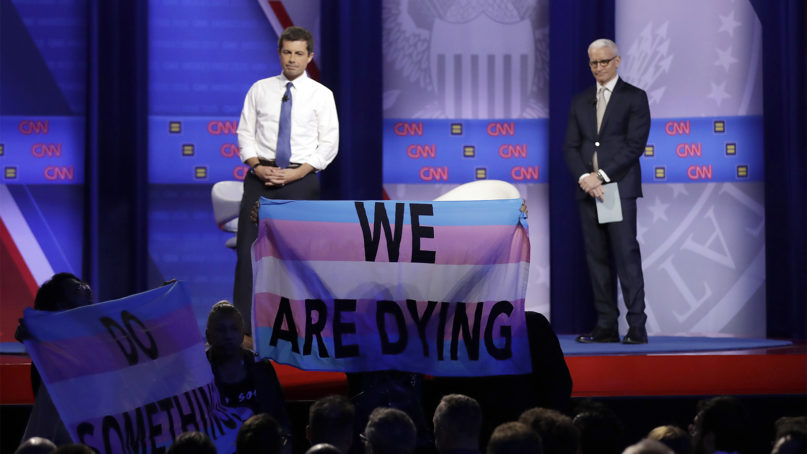(RNS) — Democratic presidential hopefuls waded into theological waters while speaking at a forum on LGBTQ equality Thursday evening (Oct. 10) in Los Angeles, contrasting their liberal approaches to faith with that of religious perspectives that oppose same-sex marriage and LGBTQ rights.
Nine candidates participated in the forum, which was organized by CNN and the LGBTQ rights advocacy group Human Rights Campaign. They fielded questions on a variety of topics, ranging from same-sex marriage to their thoughts on whether organizations and businesses should have the right to invoke religion as a reason to deny services or opportunities to LGBTQ people.
When Pete Buttigieg was asked to point to any verses in the Bible that support refusing services to LGBTQ people — a reference to so-called religious refusal laws that allow organizations and businesses to invoke religion as a reason to deny services — the openly gay mayor of South Bend, Indiana, argued he was raised with a different kind of Christian faith.
“Without telling others how to worship, the Christian tradition that I belong to instructs me to identify with the marginalized, and to recognize that the greatest thing that any of us have to offer is love,” said Buttigieg, who is Episcopalian.
He went on to contend that the right to religious freedom “ends where religion is being used as an excuse to harm other people,” and that “it makes God smaller” when faith is used to disparage another.
“It, to me, is an insult not only to us as LGBTQ people, but I think it’s an insult to faith to believe that it could be used to hurt people in that way,” he said, adding that his relationship to his husband, Chasten, has brought him closer to God.
Massachusetts Sen. Elizabeth Warren — who currently holds the top spot in the crowded field of Democratic hopefuls in some national polls — also contrasted her own Methodist faith with that of people she said harmed LGBTQ people. Asked whether there was ever a time she she didn’t support same-sex marriage, the former Sunday school teacher sang a line from “Jesus loves the little children,” a children’s hymn.
“To me, that is the heart of it, that was the basis of the faith that I grew up in,” she said. “It truly is about preciousness of each and every life, it is about the worth of every human being. I saw this as a matter of faith.”

Democratic presidential candidate Sen. Elizabeth Warren, D-Mass., speaks as CNN moderator Chris Cuomo, right, listens during the Power of our Pride Town Hall on Oct. 10, 2019, in Los Angeles. (AP Photo/Marcio Jose Sanchez)
She added the “hatefulness” against LGBTQ people “always really shocked me — especially for people of faith.”
Sen. Cory Booker of New Jersey also cited his faith to explain what motivated him to fight for LGBTQ equality.
“My faith, as well as my American values, will make me fight on every front to make sure that people are not discriminating against someone because of who they are,” he said.
Once controversial, the theology articulated by Buttigieg and others now tracks with public support for LGBTQ rights. According to a 2018 poll from the Public Religion Research Institute, majorities of most major U.S. religious groups — with the exception of white evangelical Protestants and Mormons — oppose religiously based service refusals of gay and lesbian people, as do a plurality of Jehovah’s Witnesses and “other nonwhite Protestants.” In addition, majorities of all major religious groups support laws protecting LGBTQ people from discrimination in housing, public accommodations and the workplace.
The same survey also reported that majorities of most major religious groups now support same-sex marriage, with plurality support among black Protestants and Hispanic Protestants. The outlier remains among white evangelical Protestants, a majority of whom oppose it.
At the forum, former U.S. Housing and Urban Development Secretary Julián Castro — who has invoked his Catholicism several times on the campaign trail — rejected what he saw as a false dichotomy between religious Americans and LGBTQ people.
“As a Catholic — and I’m sure we have many people of faith (in the audience) — I think we need to end this myth that these two things are separate,” he said. “There are a lot of people in the LGBTQ community that are also people of faith. They’re religious. They believe.”
Castro went on to note that religious LGBTQ people have faced hardships within faith communities. He said that while a president “can’t do anything about” religious institutions, “when it comes to government funding or how our laws treat people, everybody is going to be treated the same.”
But Beto O’Rourke of Texas argued that the government can impact religious organizations in other ways. He took what was arguably the most controversial position of the night when he argued that churches and other faith-based institutions that oppose same-sex marriage should have their tax-exempt status revoked.
“There can be no reward, no benefit, no tax break for any institution or organization in America that denies the full human rights and full civil rights of every single one of us,” he said.
The line sparked outrage from some conservatives, such as Daily Beast columnist and CNN political commentator Matt Lewis.
“This isn’t going to help win the electoral college,” Lewis tweeted Friday morning. “If you wonder why so many Christians are willing to hold their nose and support someone as horrible as Donald Trump, this helps explain it.”
Lewis also referenced Warren, who frustrated some earlier in the evening when she was asked how she would respond to someone who said they opposed same-sex marriage because of their faith.
“I’m going to assume it’s a guy who said that, and I’m going to say ‘Then, just marry one woman.’ I’m cool with that — assuming you can find one,” she joked, sparking applause and laughter from the audience.
The Episcopal Church ordains LGBTQ people and allows priests to officiate same-sex unions — including Buttigieg’s wedding. For Castro and Warren, however, some of their views are at odds with their own religious hierarchy: Both the Catholic Church and the United Methodist Church oppose same-sex marriage.
Booker, for his part, attends a church affiliated with the National Baptist Convention U.S.A. Inc. According to its website, the denomination does not support same-sex marriage as a national entity but also “does not dictate to its constituent churches what position to take on issues because we believe in the autonomy of the local church.”
This story has been updated to correct that the forum took place in Los Angeles, California, not in Salt Lake City, Utah.





